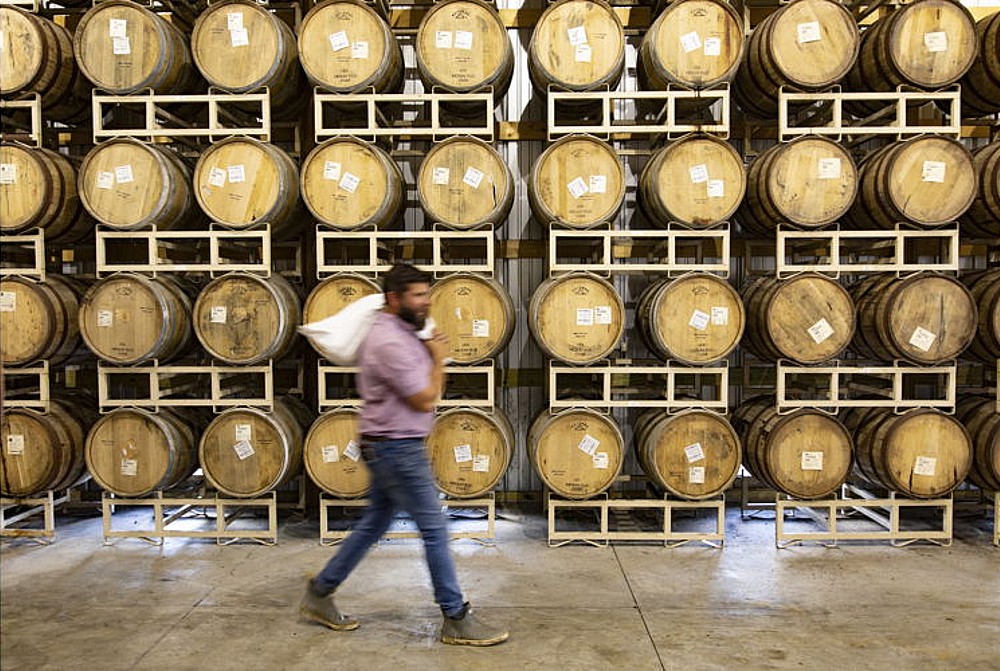
By Parker Milner, special to Statehouse Report | South Carolina has 28 micro-distilleries, none of which can serve customers after 7 p.m. or on Sundays like breweries and wineries can. In fact, these small businesses can only sell their own brands of liquor. And they can’t serve food or a cold beer.
The puzzling restrictions faced by the state’s distilleries, which say they support 20,000 South Carolina jobs, are causing even more damage to a group that, as sales slowed to a trickle during the pandemic, shifted operations to produce much-needed hand sanitizer. But, a bipartisan bill sponsored by nearly 30 state lawmakers could address what spirits industry leaders say is a fundamental issue of fairness.
“When we looked at parity, and that’s the main thing we are looking at is partial parity with the breweries, most legislators that we’ve talked to have said, ‘That makes sense,’” said High Wire Distilling owner Scott Blackwell of Charleston. “(Distilleries) are great for the community, they employ people, and are places where a lot of people take their dog and kids. The breweries get a lot more locals because of the friendliness of the laws. Without tourists in this town, it’s crushing.”

Blackwell serves as president of the South Carolina Distillers Guild, a three-year-old group of volunteers that’s been fighting for parity since its inception — the pandemic made its mission more urgent, Blackwell said. High Wire, Charleston Distilling Co., Twelve 33 Distillery, Palmetto Distillery, Six & Twenty and Burnt Church Distillery are leading the charge to get the S.C. Micro-Distillers Parity Act, H.3769, signed into law by this summer.
The Distillers Guild didn’t include everything on its wish list in the bill, filed in the state House and Senate, but it does address many of the limitations placed on the business. Currently, South Carolina distilleries are treated like liquor stores, meaning hours of operation are limited to 9 a.m.-7 p.m. Monday through Saturday.
“We’d like to be open on Sundays and stay open a little later — another hour or so,” said Charleston Distilling Co. owner Steve Heilman, who serves as the guild’s treasurer. “Not too many people want to go drinking at 9 a.m.”
Although several distillers in the state also want to extend bottle-sale hours and push for other items like self distribution, Blackwell said, the Distillers Guild came up with “realistic” requests in the bill. The big-ticket items include:
- Expand hours to seven days a week, but follow Sunday retail sales restrictions;
- Allow outside beer and wine for on-premise consumption;
- Increase the tasting limit from 3 ounces to 4.5 ounces;
- Allow tastings to occur in tasting rooms, with food; and
- Increase the amount of liquor to be sold for off-premises consumption from 3 bottles to 9 liters.

Republican Sean Bennett of Summerville, the Senate bill’s lead sponsor, helped S.C. breweries pass the so-called Stone and Pint bills, which increased the amount of beer breweries could sell and patrons could consume onsite. Bennett started working with the distilleries toward the end of 2020, before filing the bill in January, he told the Charleston City Paper.
“I’m really relatively hopeful, mainly because we’re not trying to do anything different. We’re really just trying to bring the micro-distilleries to the same level of parity with the breweries,” Bennett said.
“As an effective advocate for an industry that has a significant footprint in Charleston and North Charleston, my job is to break down the arcane barriers that, in my view, no longer need to exist,” said S.C. Sen. Marlon Kimpson, D-Charleston. “Over the summer, I toured some of these facilities, and to me, them asking to serve food made total sense, particularly when you look out the window and see a brewery able to do the same thing. What this bill does is it essentially closes the gap.”

State Rep. Wendell Gilliard, D-Charleston, is hopeful one of the bills will pass by the April 10 deadline to be considered by the other chamber.
“I believe that competitiveness is always good for business, and to me, that makes all those types of businesses competitive. It’s a win win situation, and I think it’s coming at the right time,” Gilliard told the City Paper.
The bill’s chief sponsor in the House, S.C. Rep. Leon Stavrinakis, D-Charleston, did not respond to requests for comment.
According to the latest statistics from the S.C. Brewers Guild, the number of South Carolina breweries has more than tripled since 2013, meaning more production, distribution and revenue for brewers and distributors. Still, Bennett knows the bill will face opposition from liquor distributors, who think the relaxed laws will dip into their margins. He said he hoped they will realize that making distilleries more viable businesses will help the industry as a whole.
“We have some pretty strong pushback from people participating in the three-tier system,” said Bennett, referring to the state’s system that requires alcohol distributors to serve as middlemen between wholesalers and retail businesses. “The beer distributors are probably in agreement that it’s helped their industry. We’ve got a good story to tell.”
Why it matters
At small distilleries, there could be a large uptick in sales if the bill is passed, Nippitatty Distillery owner Traxler Littlejohn told the City Paper.
“It would mean the world to us, because it increases a huge revenue stream. Right now, even during COVID, our overall sales in the tasting room dropped, but people were still coming by to do a tour and grab a bottle,” said Littlejohn. State regulations prohibit consumers from buying more than three bottles directly from a liquor producer. “This (would) allow us to sell more bottles.”

Scott Newitt, an owner of Firefly Distillery in North Charleston, led the S.C. liquor industry out of the dark ages in 2007, helping to push legislation that allowed tasting inside distilleries and lowered the cost of opening a distillery. He said opening distilleries on Sundays is the next logical step as Charleston looks to reignite its tourism industry post-pandemic.
“It’s all about being open when tourists are here, so the ability to be open on Sunday is a big deal. That would be great for tourism for us and promote South Carolina products,” said Newitt. Currently, when Firefly closes at 7 p.m., Newitt’s customers can walk around the corner to Holy City Brewing, which operates a full-service restaurant and bar until 10 p.m. nightly — with Firefly, Nippitatty and High Wire spirits on the menu.
“I just want people to be able to come sample my brand at my place,” Newitt said.
Blackwell can hardly contain his frustration when talking about the current laws facing local distilleries. It’s time South Carolina provided relief for distilleries like other states have throughout the pandemic, he said.
“It’s kind of maddening, so I’m pretty passionate about this. Your neighboring states are doing it already. These states are way beyond where we are,” Blackwell said. “(Distilleries) have to pass more background checks than any bar or restaurants and are not allowed to do a fifth of what they do.”
Parker Milner is a reporter with the Charleston City Paper. Have a comment? Send to: feedback@statehousereport.com. Make sure to add your name and contact information for verification.















 We Can Do Better, South Carolina!
We Can Do Better, South Carolina!
Pingback: Charleston Currents – NEW for 3/15: No-kill grant; Budget reporting; Wienermobile
Pingback: Charleston Currents – NEWS BRIEFS: Wienermobile made Mount Pleasant appearance Thursday
Sugar Tit Distillery is a tourist attraction. When folks want to buy a case to distribute for Christmas gifts they can’t, according to SC law. They can however go to a local liquor store and buy as much as they like. But they aren’t shopping or stopping to shop, they are touring and buying a unique product directly from the still, when they are psyched about it! They won’t leave us and go to a liquor store to purchase it. SC looses sale like this every darn day!